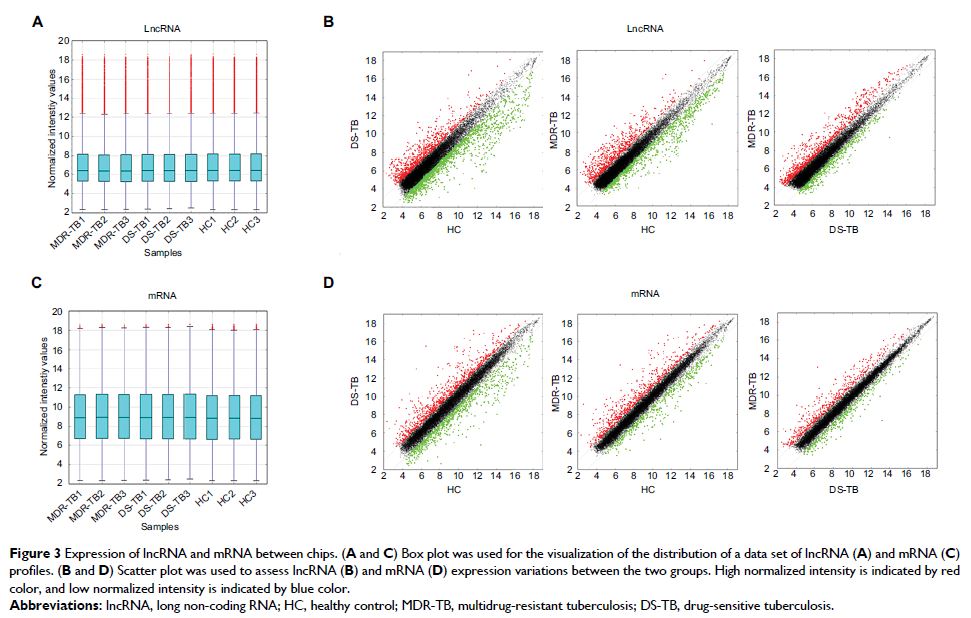108605
论文已发表
注册即可获取德孚的最新动态
IF 收录期刊
- 3.4 Breast Cancer (Dove Med Press)
- 3.2 Clin Epidemiol
- 2.6 Cancer Manag Res
- 2.9 Infect Drug Resist
- 3.7 Clin Interv Aging
- 5.1 Drug Des Dev Ther
- 3.1 Int J Chronic Obstr
- 6.6 Int J Nanomed
- 2.6 Int J Women's Health
- 2.9 Neuropsych Dis Treat
- 2.8 OncoTargets Ther
- 2.0 Patient Prefer Adher
- 2.2 Ther Clin Risk Manag
- 2.5 J Pain Res
- 3.0 Diabet Metab Synd Ob
- 3.2 Psychol Res Behav Ma
- 3.4 Nat Sci Sleep
- 1.8 Pharmgenomics Pers Med
- 2.0 Risk Manag Healthc Policy
- 4.1 J Inflamm Res
- 2.0 Int J Gen Med
- 3.4 J Hepatocell Carcinoma
- 3.0 J Asthma Allergy
- 2.2 Clin Cosmet Investig Dermatol
- 2.4 J Multidiscip Healthc

对 PBMC 中响应多重耐药结核感染、具有差异表达的长非编码 RNA 进行鉴别
Authors Yan H, Xu R, Zhang XR, Wang Q, Pang J, Zhang X, Chang X, Zhang Y
Received 16 October 2017
Accepted for publication 30 April 2018
Published 13 July 2018 Volume 2018:11 Pages 945—959
DOI https://doi.org/10.2147/IDR.S154255
Checked for plagiarism Yes
Review by Single-blind
Peer reviewers approved by Dr Cristina Weinberg
Peer reviewer comments 2
Editor who approved publication: Dr Joachim Wink
Purpose: The aim of this paper was to identify differentially expressed
long non-coding RNAs (lncRNAs) in peripheral blood mononuclear cells (PBMCs)
influenced by the infection of multidrug-resistant tuberculosis (MDR-TB).
Materials and
methods: IncRNA and mRNA expression profiles
in PBMCs derived from healthy controls (HCs) and individuals with MDR-TB and
drug-sensitive tuberculosis (DS-TB) were analyzed and compared by microarray
assay. Six lncRNAs were randomly selected for validation by using real-time
quantitative polymerase chain reaction (RT-qPCR). The biological functions and
signaling pathways affected by the differentially expressed mRNAs were
investigated by using Gene Ontology (GO) and Kyoto Encyclopedia of Genes and
Genomes (KEGG) pathway-based approaches.
Results: Compared with the HC group, 1,429 lncRNAs (983 mRNAs) and 2,040
lncRNAs (1,407 mRNAs) were identified to be deregulated in the MDR-TB group and
in the DS-TB group, respectively, and 1,511 lncRNAs and 1,047 mRNAs were
identified to be differentially expressed in both MDR-TB and DS-TB groups.
Between the three groups, 22 lncRNAs and 38 mRNAs were found deregulated. Most
deregulated lncRNAs were from intergenic regions (~55% of the total), natural
antisense to protein-coding loci (~32% of the total), or intronic antisense to
protein-coding loci (~5% of the total). Significantly enriched signaling
pathways regulated by the deregulated mRNAs were mainly associated with natural
killer cell-mediated cytotoxicity, antigen processing and presentation,
graft-vs-host disease, the transforming growth factor-β signaling pathway, and
the Hippo signaling pathway.
Conclusion: This study is the first to report differentially expressed lncRNAs
in PBMCs in response to MDR-TB infection. It revealed that some lncRNAs might
be associated with regulating host immune response to MDR-TB infection. Further
elucidation of the potential of these deregulated lncRNAs in MDR-TB and its
reactivation requires further study.
Keywords: mycobacterium tuberculosis, MDR, molecular characterization,
lncRNA, infection
